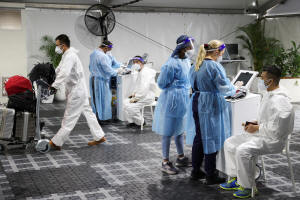Vaccination, not travel curbs, key to battling Omicron, WHO says
 Send a link to a friend
Send a link to a friend
[ December 03, 2021]
GENEVA (Reuters) - The World Health
Organization (WHO) urged countries to boost healthcare capacity and
vaccinate their people to fight a surge in COVID-19 cases driven by the
Omicron variant, saying that travel curbs could buy time but alone were
not the answer. December 03, 2021]
GENEVA (Reuters) - The World Health
Organization (WHO) urged countries to boost healthcare capacity and
vaccinate their people to fight a surge in COVID-19 cases driven by the
Omicron variant, saying that travel curbs could buy time but alone were
not the answer.
Despite shutting its borders to travel from high-risk southern African
countries, Australia became the latest country to report community
transmission of the new variant, a day after it was found in five U.S.
states.
Omicron has gained a foothold in Asia, Africa, the Americas, the Middle
East and Europe and has reached seven of the nine provinces of South
Africa, where it was first identified. Many governments have tightened
travel rules to keep the variant out.
"Border controls can buy time but every country and every community must
prepare for new surges in cases," Takeshi Kasai, the WHO's western
Pacific director, told a media briefing.
"People should not only rely on border measures. What is most important
is to prepare for these variants with potential high transmissibility.
So far the information available suggests we don't have to change our
approach."
Kasai urged countries to fully vaccinate vulnerable groups and stick to
preventive measures such as mask wearing and social distancing.

Omicron has been listed as a "variant of concern" by the WHO and
scientists are still gathering data to establish how severe and
contagious it is just as parts of Europe have been hit by surges of
winter infections by the more familiar Delta variant.
"I have not seen reports of Omicron-related deaths yet," WHO spokesman
Christian Lindmeier told a U.N. briefing in Geneva.
But vaccine makers should prepare for the likelihood of adjusting their
products to protect against Omicron, he said.
Ugur Sahin, CEO of Germany's BioNTech, which makes a COVID vaccine with
Pfizer, told the Reuters Next conference the company should be able to
adapt the shots relatively quickly.
Sahin also said that current vaccines should continue to provide
protection against severe disease, despite mutations.
Almost 264 million people have been reported to be infected by the
coronavirus since it was first detected in central China in late 2019
and 5.48 million people have died, according to a Reuters tally.
'SCIENCE AND SPEED'
Vaccination rates vary from country to country but there are worrying
gaps in poorer countries. Indonesia, the world's fourth most populous
country and once Asia's COVID-19 epicentre, has fully inoculated only
about 35% of its population.
[to top of second column]
|

Travellers receive tests for the coronavirus disease (COVID-19) at a
pre-departure testing facility, as countries react to the new
coronavirus Omicron variant, outside the international terminal at
Sydney Airport in Sydney, Australia, November 29, 2021.
REUTERS/Loren Elliott

Australia's chief medical officer, Paul Kelly, said Omicron was likely
to become the dominant variant globally within months, but at this stage
there was no evidence it was any more dangerous than Delta.
In the United States, the Biden administration
announced measures to guard against the virus spreading. From
Monday, international air travellers arriving in the United States
will have to have obtained a negative COVID-19 test within a day of
travel.
"We're going to fight this variant with science and speed, not chaos
and confusion," President Joe Biden said.
Fewer than 60% of the U.S. population have been fully vaccinated,
one of the lowest rates among wealthy nations.
Global travel curbs have accelerated with Hong Kong, the
Netherlands, Norway and Russia, among others, announcing new
measures on Thursday.
Aside from wreaking havoc in the travel industry, the clampdown has
pounded financial markets and undermined major economies just as
they were beginning to recover from the lockdowns triggered by
Delta.
Bank of England policymaker Michael Saunders, who voted for an
interest rate hike last month, said on Friday he wanted more
information about Omicron before deciding how to vote this month.
"At present, given the new Omicron COVID variant has only been
detected quite recently, there could be particular advantages in
waiting to see more evidence on its possible effects on public
health outcomes and hence on the economy," Saunders said in a
speech.
Germany said it would bar the unvaccinated from all but essential
businesses, and legislation to make vaccination mandatory would be
drafted for early next year.
Several countries, including Britain and the United States, were
bringing forward plans to offer booster shots, but, like travel
bans, they are controversial.

Many scientists say the way to stop the virus spreading is to make
sure poorer countries have access to vaccines, not to give blanket
booster shots to people in richer countries.
(Reporting by Reuters bureaux; Writing by Stephen Coates and Nick
Macfie; Editing by Simon Cameron-Moore and Angus MacSwan)
[© 2021 Thomson Reuters. All rights
reserved.] Copyright 2021 Reuters. All rights reserved. This material may not be published,
broadcast, rewritten or redistributed.
Thompson Reuters is solely responsible for this content. |